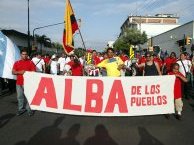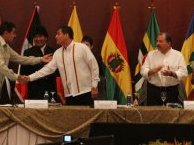
The Bolivarian Alternative for the Americas (ALBA in Spanish) is a project to counteract the US-backed Free Trade Area of the Americas. Born out of initial agreements forged between the governments of Venezuela and Cuba in December 2004, ALBA aims to promote regional integration of Latin America based on values and objectives opposed to imperialism. However, it continues to rely on some basic neoliberal tenets, such as a strong emphasis on exports. Concretely, it involves Cuba, Bolivia and Venezuela through cooperation pacts covering a wide range of areas such as energy, health and culture. Nicaragua officially joined in January 2007, followed by Dominica, Saint Vincent and Antigua in February 2007. In June 2009, Ecuador became a full member.
The People’s Trade Agreement (TCP in Spanish) is considered the trade arm of ALBA. It is a direct effort to defeat the bilateral free trade agreements that the US government has been pushing in Latin America. The TCP aims to promote trade in the region along principles of solidarity, cooperation and complementarity. It was launched in May 2006.
Together, ALBA and TCP form a popular axis of today’s push for "alternative" regional integration in Latin America with the direct backing of Hugo Chavez, Fidel Castro and Evo Morales.
On 4-5 February 2012, the 11th ALBA-TCP summit was held in Caracas, Venezuela. It was decided at this meeting to create an ALBA-TCP Economic Space (ECOALBA) "as a shared-development, inter-dependent, sovereign and supportive economic zone aimed at consolidating and enlarging a new alternative model of economic relations that will strengthen and diversify the production apparatus and trade exchanges, as well as establishing the bases for the bilateral and multilateral instruments that the Parties may enter into on this matter, with a view to satisfying the physical and spiritual needs of our peoples."
last update: May 2012
Photo: Xavier Granja Cedeño - Ministerio de Relaciones Exteriores y Movilidad Humana. CC-BY-SA-2.0
Fóto: Xavier Granja Cedeño - Ministerio de Relaciones Exteriores y Movilidad Humana. CC-BY-SA-2.0


 :
ALBA
:
ALBA


